Examsrevision
On this page, you find all documents, package deals, and flashcards offered by seller ExamsRevision.
- 1082
- 0
- 127
Community
- Followers
- Following
23 Reviews received
1209 items
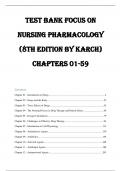
TEST BANK FOCUS ON NURSING PHARMACOLOGY (8TH EDITION BY KARCH) CHAPTERS 01-59
TEST BANK FOCUS ON NURSING PHARMACOLOGY (8TH EDITION BY KARCH) CHAPTERS 01-59 LATEST UPDATE 2024 Contents Chapter 01 - Introduction to Drugs 4 Chapter 02 - Drugs and the Body 23 Chapter 03 - Toxic Effects of Drugs 42 Chapter 04 - The Nursing Process in Drug Therapy and Patient Safety 60 Chapter 05 - Dosage Calculations 79 Chapter 06 - Challenges to Effective Drug Therapy 94 Chapter 07 - Introduction to Cell Physiology 113 Chapter 08 - Antiinfective Agents 130 Chapter 09 - Anti...
- Exam (elaborations)
- • 1018 pages •
TEST BANK FOCUS ON NURSING PHARMACOLOGY (8TH EDITION BY KARCH) CHAPTERS 01-59 LATEST UPDATE 2024 Contents Chapter 01 - Introduction to Drugs 4 Chapter 02 - Drugs and the Body 23 Chapter 03 - Toxic Effects of Drugs 42 Chapter 04 - The Nursing Process in Drug Therapy and Patient Safety 60 Chapter 05 - Dosage Calculations 79 Chapter 06 - Challenges to Effective Drug Therapy 94 Chapter 07 - Introduction to Cell Physiology 113 Chapter 08 - Antiinfective Agents 130 Chapter 09 - Anti...
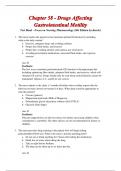
Test Bank - Focus on Nursing Pharmacology (8th Edition by Karch) |Chapters 56-59|
Chapter 56 Introduction to the Gastrointestinal System Chapter 57 Drugs Affecting Gastrointestinal Secretions Chapter 58 Drugs Affecting Gastrointestinal Motility Chapter 59 Antiemetic Agents
- Package deal
- • 4 items •
- Chapter 56 - Introduction to the Gastrointestinal System |Test Bank - Focus on Nursing Pharmacology (8th Edition by Karch) • Exam (elaborations)
- Chapter 57 - Drugs Affecting Gastrointestinal Secretions |Test Bank - Focus on Nursing Pharmacology (8th Edition by Karch) • Exam (elaborations)
- Chapter 59 - Antiemetic Agents |Test Bank - Focus on Nursing Pharmacology (8th Edition by Karch) • Exam (elaborations)
- Chapter 58 - Drugs Affecting Gastrointestinal Motility |Test Bank - Focus on Nursing Pharmacology (8th Edition by Karch) • Exam (elaborations)
Chapter 56 Introduction to the Gastrointestinal System Chapter 57 Drugs Affecting Gastrointestinal Secretions Chapter 58 Drugs Affecting Gastrointestinal Motility Chapter 59 Antiemetic Agents

Chapter 58 - Drugs Affecting Gastrointestinal Motility |Test Bank - Focus on Nursing Pharmacology (8th Edition by Karch)
1. The nurse teaches the patient to best maintain optimal GI function by including what in the daily routine? a. Exercise, adequate sleep, and avoiding caffeine b. Proper diet, fluid intake, and exercise c. Proper diet, avoiding alcohol, and cautious use of laxatives d. Avoiding prescription medications, increased fluid intake, and vigorous exercise Ans: B Feedback: The best way to maintain gastrointestinal (GI) function is through proper diet including optimizing fiber intake, adequat...
- Package deal
- Exam (elaborations)
- • 12 pages •
1. The nurse teaches the patient to best maintain optimal GI function by including what in the daily routine? a. Exercise, adequate sleep, and avoiding caffeine b. Proper diet, fluid intake, and exercise c. Proper diet, avoiding alcohol, and cautious use of laxatives d. Avoiding prescription medications, increased fluid intake, and vigorous exercise Ans: B Feedback: The best way to maintain gastrointestinal (GI) function is through proper diet including optimizing fiber intake, adequat...
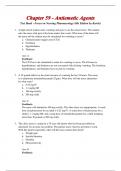
Chapter 59 - Antiemetic Agents |Test Bank - Focus on Nursing Pharmacology (8th Edition by Karch)
1. A high school student starts vomiting and goes to see the school nurse. The student asks the nurse what part of his brain makes him vomit. What area of the brain will the nurse tell the student must be stimulated for vomiting to occur? a. Chemoreceptor trigger zone (CTZ) b. Forebrain c. Hypothalamus d. Thalamus Ans: A Feedback: The CTZ has to be stimulated in order for vomiting to occur. The GI mucosa, hypothalamus, and thalamus are not associated with eliciting vomiting. The forebra...
- Package deal
- Exam (elaborations)
- • 12 pages •
1. A high school student starts vomiting and goes to see the school nurse. The student asks the nurse what part of his brain makes him vomit. What area of the brain will the nurse tell the student must be stimulated for vomiting to occur? a. Chemoreceptor trigger zone (CTZ) b. Forebrain c. Hypothalamus d. Thalamus Ans: A Feedback: The CTZ has to be stimulated in order for vomiting to occur. The GI mucosa, hypothalamus, and thalamus are not associated with eliciting vomiting. The forebra...

Test Bank - Focus on Nursing Pharmacology (8th Edition by Karch) |Chapters 51-55|
Chapter 51 Diuretic Agents Chapter 52 Drugs Affecting the Urinary Tract and the Bladder Chapter 53 Introduction to the Respiratory System Chapter 54 Drugs Acting on the Upper Respiratory Tract Chapter 55 Drugs Acting on the Lower Respiratory Tract
- Package deal
- • 5 items •
- Chapter 51 - Diuretic Agents |Test Bank - Focus on Nursing Pharmacology (8th Edition by Karch) • Exam (elaborations)
- Chapter 53 - Introduction to the Respiratory System |Test Bank - Focus on Nursing Pharmacology (8th Edition by Karch) • Exam (elaborations)
- Chapter 52 - Drugs Affecting the Urinary Tract and the Bladder |Test Bank - Focus on Nursing Pharmacology (8th Edition by Karch) • Exam (elaborations)
- Chapter 54 - Drugs Acting on the Upper Respiratory Tract |Test Bank - Focus on Nursing Pharmacology (8th Edition by Karch) • Exam (elaborations)
- Chapter 55 - Drugs Acting on the Lower Respiratory Tract |Test Bank - Focus on Nursing Pharmacology (8th Edition by Karch) • Exam (elaborations)
Chapter 51 Diuretic Agents Chapter 52 Drugs Affecting the Urinary Tract and the Bladder Chapter 53 Introduction to the Respiratory System Chapter 54 Drugs Acting on the Upper Respiratory Tract Chapter 55 Drugs Acting on the Lower Respiratory Tract
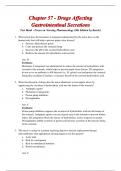
Chapter 57 - Drugs Affecting Gastrointestinal Secretions |Test Bank - Focus on Nursing Pharmacology (8th Edition by Karch)
1. What action does the histamine-2 antagonist administered by the nurse have on the human body that will help to prevent peptic ulcer disease? a. Destroys Helicobacter pylori b. Coats and protects the stomach lining c. Increases the pH of the secreted hydrochloric acid d. Reduces the amount of hydrochloric acid secreted Ans: D Feedback: Histamine-2 antagonists are administered to reduce the amount of hydrochloric acid secreted in the stomach, which helps to prevent peptic ulcer diseas...
- Package deal
- Exam (elaborations)
- • 12 pages •
1. What action does the histamine-2 antagonist administered by the nurse have on the human body that will help to prevent peptic ulcer disease? a. Destroys Helicobacter pylori b. Coats and protects the stomach lining c. Increases the pH of the secreted hydrochloric acid d. Reduces the amount of hydrochloric acid secreted Ans: D Feedback: Histamine-2 antagonists are administered to reduce the amount of hydrochloric acid secreted in the stomach, which helps to prevent peptic ulcer diseas...

Chapter 55 - Drugs Acting on the Lower Respiratory Tract |Test Bank - Focus on Nursing Pharmacology (8th Edition by Karch)
1. A 70-year-old man is being treated for chronic obstructive pulmonary disease (COPD) with theophylline (Theo-Dur). What will be a priority assessment by the nurse? a. Ingestion of fatty foods b. Weight c. Activity level d. Use of nicotine Ans: D Feedback: Nutritional status, weight, and activity level would be important for a nurse to know about a COPD patient. However, it would be most important for the nurse to know whether the patient smokes or uses tobacco in other ways or smoking...
- Package deal
- Exam (elaborations)
- • 14 pages •
1. A 70-year-old man is being treated for chronic obstructive pulmonary disease (COPD) with theophylline (Theo-Dur). What will be a priority assessment by the nurse? a. Ingestion of fatty foods b. Weight c. Activity level d. Use of nicotine Ans: D Feedback: Nutritional status, weight, and activity level would be important for a nurse to know about a COPD patient. However, it would be most important for the nurse to know whether the patient smokes or uses tobacco in other ways or smoking...
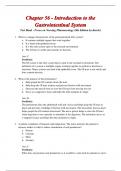
Chapter 56 - Introduction to the Gastrointestinal System |Test Bank - Focus on Nursing Pharmacology (8th Edition by Karch)
1. What is a unique characteristic of the gastrointestinal (GI) system? a. It contains multiple organs that work together. b. It is lined with epithelial tissue. c. It is the only system open to the external environment. d. The GI tract is sterile and contains no bacteria. Ans: C Feedback: The GI system is the only system that is open to the external environment. The definition of a system is multiple organs working together to perform a function or functions. Many systems are lined wi...
- Package deal
- Exam (elaborations)
- • 12 pages •
1. What is a unique characteristic of the gastrointestinal (GI) system? a. It contains multiple organs that work together. b. It is lined with epithelial tissue. c. It is the only system open to the external environment. d. The GI tract is sterile and contains no bacteria. Ans: C Feedback: The GI system is the only system that is open to the external environment. The definition of a system is multiple organs working together to perform a function or functions. Many systems are lined wi...

Chapter 54 - Drugs Acting on the Upper Respiratory Tract |Test Bank - Focus on Nursing Pharmacology (8th Edition by Karch)
1. A patient comes to the clinic with symptoms as seen in a cold. What group of upper respiratory drugs causes local vasoconstriction, which decreases blood flow and shrinks swollen membranes to improve air flow? a. Antitussives b. Decongestants c. Expectorants d. Mucolytics Ans: B Feedback: Decongestants cause local vasoconstriction that decreases blood flow to irritated and dilated capillaries of the mucous membranes lining the nasal passages and sinus cavities. This vasoconstriction ...
- Package deal
- Exam (elaborations)
- • 14 pages •
1. A patient comes to the clinic with symptoms as seen in a cold. What group of upper respiratory drugs causes local vasoconstriction, which decreases blood flow and shrinks swollen membranes to improve air flow? a. Antitussives b. Decongestants c. Expectorants d. Mucolytics Ans: B Feedback: Decongestants cause local vasoconstriction that decreases blood flow to irritated and dilated capillaries of the mucous membranes lining the nasal passages and sinus cavities. This vasoconstriction ...
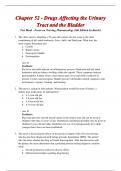
Chapter 52 - Drugs Affecting the Urinary Tract and the Bladder |Test Bank - Focus on Nursing Pharmacology (8th Edition by Karch)
1. The clinic nurse is admitting a 39-year-old woman who has come to the clinic complaining of left-sided tenderness, fever, chills, and flank pain. What does the nurse suspect the patient has? a. Cystitis b. Kidney stones c. Neurogenic bladder d. Pyelonephritis Ans: D Feedback: The fever and chills indicate an inflammatory process. Flank pain and left-sided tenderness indicate kidney swelling within the capsule. These symptoms indicate pyelonephritis. Kidney stones cause intense pain; ...
- Package deal
- Exam (elaborations)
- • 13 pages •
1. The clinic nurse is admitting a 39-year-old woman who has come to the clinic complaining of left-sided tenderness, fever, chills, and flank pain. What does the nurse suspect the patient has? a. Cystitis b. Kidney stones c. Neurogenic bladder d. Pyelonephritis Ans: D Feedback: The fever and chills indicate an inflammatory process. Flank pain and left-sided tenderness indicate kidney swelling within the capsule. These symptoms indicate pyelonephritis. Kidney stones cause intense pain; ...

Chapter 17: Central Nervous System Stimulants Introductory Clinical Pharmacology 12th Edition by Susan M Ford
TEST BANK PUBLIC HEALTH NURSING: POPULATION-CENTERED HEALTH CARE IN THE COMMUNITY, 10TH EDITION BY STANHOPE
Chapter 28: Care of Patients with Disorders of the Upper Gastrointestinal System |deWit: Medical-Surgical Nursing: Concepts & Practice, 3rd Edition
Chapter 48: Immunostimulants and Immunomodulators Introductory Clinical Pharmacology 12th Edition by Susan M Ford
Chapter 47: Vaccines Introductory Clinical Pharmacology 12th Edition by Susan M Ford